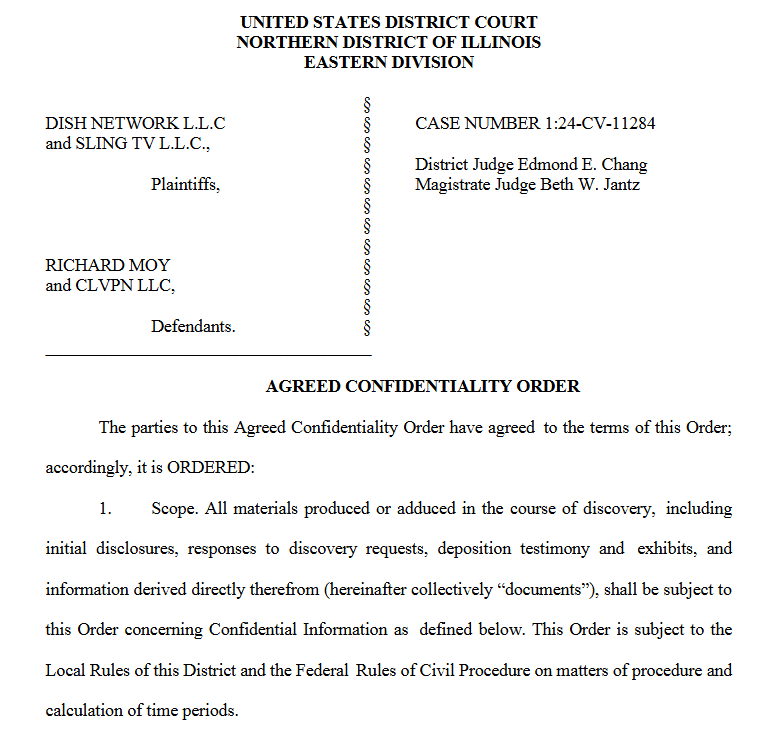 In many respects a lawsuit filed in November 2024 by DISH Network and Sling TV was similar to others filed by the companies in recent years.
In many respects a lawsuit filed in November 2024 by DISH Network and Sling TV was similar to others filed by the companies in recent years.
Filed at a federal court in Illinois, the lawsuit targeted Richard Moy, the alleged owner of CLVPN LLC, which traded under the name City Lights Entertainment.
According to the complaint, Moy had invested considerable sums of money obtaining servers and streams in order to provide a “top notch” IPTV service, fueled by TV channel content illegally obtained direct from the plaintiffs’ servers.
Since that necessarily involves circumvention of technical measures, DISH and Sling claimed violations of the DMCA under 17 U.S.C. § 1201(a)(2) and 17 U.S.C. § 1201(b)(1). Unusually, the companies also alleged violations of the Electronic Communications Privacy Act (ECPA), specifically 18 U.S.C. §§ 2511(1)(c)-(d), which concerns interception of a real-time transmission.
Complaint Suggested a Massive Operation
Subscriptions were reportedly sold both in bulk to a network of resellers, and on an individual basis direct to end users. A claim reportedly made by Moy himself, that his network had “over 500 sellers” made it into the complaint. The allegation that Moy’s service had over 450,000 users, apparently wasn’t guesswork. DISH and Sling somehow gained direct access to Moy’s IPTV management panel and saw the data for themselves.
Even when one month subscriptions (credits) were sold to resellers for just $5 each, that’s $2.25 million in monthly revenue; $27 million on an annual basis. On top of that eye watering amount, the complaint alleged that “Moy held himself out as a Chicago-area law enforcement officer,” when selling to customers, “to mitigate potential concerns over the unlawfulness of the Service.”
Whatever the intent, there were no signs of mitigation in DISH and Sling’s claim for damages; statutory damages up to $2,500 for each violation of the DMCA’s anti-circumvention provisions (usually assessed on a per-subscriber basis), plus $100 for each day of violations under ECPA, or $10,000, whichever was greater.
Moy Answers Complaint, Confidentiality Ensues
On January 27, 2025, Moy filed his answer to the complaint, admitting that he served as the sole manager of CLVPN and accepting that the Court had personal jurisdiction over the defendants.
The remainder of the allegations and claims were either denied outright, or denied on the basis that the defendants lacked sufficient information to admit or deny the allegations.
On the same date, an agreed confidentiality order was submitted to the court to ensure that sensitive information obtained during discovery – including how the content was obtained and details concerning Moy’s business – wouldn’t see the light of day.

Early June 2024 it was reported that the parties had exchanged initial disclosures and written discovery, and there had been no disputes.
“The parties have exchanged settlement positions, but do not request a settlement conference at this time,” Magistrate Judge Beth W. Jantz reported.
Defendants Run Out of Funds
Mid-August 2025, counsel for the defense filed an unopposed motion to withdraw. Noting that the parties had conducted settlement negotiations and extensive written discovery has been undertaken, the motion stated that the defendants no longer had “sufficient financial resources to continue the representation.”
The motion indicated that not only would the attorney not be paid for any further work, but was still owed for work already done. A motion filed by Moy late August in respect of future representation was swiftly denied by District Judge Edmond E. Chang.
“On review of Defendant Moy’s motion for attorney representation, the motion is denied without prejudice. First, the motion was not accompanied by a financial affidavit, even though the Court explained that requirement at the prior hearing,” the Judge wrote.
“Second, on review of the complaint and the stage of the case, right now a high-school graduate like Defendant Moy can defense this case adequately on his own. The alleged facts are detailed in the complaint and are straightforward, and the cited statutes for the three claims also have, as applicable to this case so far, straightforward elements.”
Parties Agree to Settle
The prospect of conducting an “adequate” solo defense in a case like this, against plaintiffs DISH and Sling, does seem a little optimistic. Fortunately, it appears that Moy was spared the experience.
Last Friday, the parties filed a joint motion for final judgment and permanent injunction.
“The parties entered into a confidential settlement in this case. Under that settlement, the parties have agreed to the Court’s entry of a final judgment awarding statutory damages and a permanent injunction that enjoins Defendants from providing any infringing streaming service,” the motion reads.
The motion continues by noting that the permanent injunction and statutory damages are both authorized by the DMCA. For each violation of section 1201, statutory damages of not less than $200 or more than $2,500 are available for “each act of circumvention, device, product, component, offer, or performance of service.”
The final amount is less than the maximum, based on a “conservative” estimate that aligns with damages calculations deemed acceptable in previous DISH/Sling lawsuits.

“The parties request that the Court enter the agreed final judgment and permanent injunction, which resolves all claims in this case, as doing so will conserve judicial resources and allow the parties to avoid the expense and other burdens of continued litigation,” the motion concludes.
The complaint and motion for final judgment and injunction are available here (1,2, pdf)
From: TF, for the latest news on copyright battles, piracy and more.
Powered by WPeMatico
